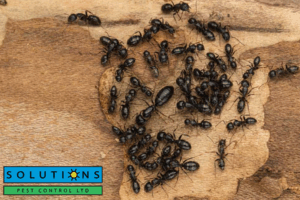Black ants may seem like minor annoyances at first, but these tiny invaders can quickly turn into a persistent indoor problem. While a single ant trailing across your kitchen counter may not raise alarms, it often signals a much larger colony working silently behind the scenes. Understanding how these pests move from outdoor wanderers to indoor residents is key to keeping your home ant-free.
In this article, we’ll explore how black ant infestations begin, what attracts them to your home, how they spread, and what you can do to prevent them.
Why Are Black Ants Attracted to Your Home?
Black ants are foragers by nature. Their primary motivation is food, and unfortunately, your kitchen provides an ideal buffet. Even the smallest crumbs or spills can attract a scout ant, which will then leave a scent trail for the rest of the colony to follow. Once a food source is identified, a line of ants can form in a matter of hours.
Food and Water Are Primary Lures
Food isn’t the only factor, moisture is another big draw for black ants. Leaky pipes, wet sponges, and condensation under appliances can create ideal conditions. Kitchens, bathrooms, and basements are common hotspots because they provide easy access to both nourishment and water.
Scent Trails That Signal More Ants
When a scout ant finds food, it releases pheromones to guide others to the source. These scent trails are like highways that ants use to move efficiently between the colony and the food. That’s why you often see ants marching in a line following a chemical trail left by their fellow worker ants.
How Do Black Ant Colonies Form Indoors?
Contrary to popular belief, black ants don’t always build their colonies outdoors. If conditions are right, they’ll settle indoors, especially in areas with warmth, food, and moisture. Some colonies begin outside and only send foragers inside. Others may move entirely indoors if the environment suits them better.
Entry Points: Cracks, Gaps, and Openings
Ants are incredibly skilled at finding entryways into your home. Gaps under doors, foundation cracks, and spaces around plumbing or wiring are common access points. Once inside, they look for wall voids, insulation, or crevices where they can nest and remain hidden.
Secondary Colonies and Satellite Nests
A major reason black ant infestations can feel endless is their ability to create satellite nests. These are smaller colonies formed away from the main nest to make foraging easier. It also makes infestations harder to eliminate, as removing one colony doesn’t necessarily mean the end of the problem.
How Black Ants Spread Through Your Home
The moment black ants discover a reliable food or water source, they begin to spread. Their trails branch out, covering more ground and creating a network of paths throughout your home. You might initially notice them in the kitchen, only to find them later in bathrooms, laundry rooms, or even bedrooms.
Night Activity and Quiet Invasions
Black ants are often most active at night or when your home is quiet. This helps them avoid detection and makes it easier for them to spread undisturbed. If you’re seeing ants during the day, chances are the infestation is already well-established.
Reproductive Ants and Swarms
Another concerning sign is the presence of winged ants, also known as swarmers. These reproductive ants leave the nest to start new colonies. If you’re seeing swarmers inside your home, it’s a sign that a colony may be nesting within your walls or floors. If you’re wondering, do black ants bite? While they rarely pose a physical threat, their presence can be invasive and unhygienic.
Common Signs of a Black Ant Infestation
Being able to identify an infestation early can prevent it from spreading further. Look out for:
- Trails of ants in kitchens or pantries
- Small piles of soil or debris near baseboards or foundation
- Rustling noises inside walls (in severe cases)
- Presence of winged ants indoors
- Recurring ant activity despite cleaning
If you spot these signs, it may be time to search for professional ant control near me before the infestation worsens.
How to Prevent Black Ant Infestations Indoors
Prevention is your first line of defense when it comes to black ants. Start by cutting off the two main attractants: food and water.
Seal Entry Points
Inspect your home for cracks and gaps that ants might use to enter. Caulking around windows, doors, and plumbing can go a long way toward keeping them out.
Maintain a Clean Environment
Clean up spills immediately, store food in airtight containers, and avoid leaving pet food out overnight. Even crumbs under appliances can attract ants.
Eliminate Moisture Sources
Fix leaky faucets and ensure proper ventilation in damp areas like basements and laundry rooms. Use a dehumidifier if needed.
Yard Maintenance
Keep shrubs and trees trimmed back from the house. Ants often use these as bridges to get inside. Remove yard debris, which can be a nesting site for black ants.
When to Call for Professional Help
While minor infestations can often be handled with vigilance and preventive measures, some situations require expert intervention. If ants continue to return despite your efforts, or if you’ve noticed satellite colonies or swarmers, it’s time to contact professionals offering pest control Richmond BC.
Expert pest control specialists understand ant behavior, colony structure, and use proven techniques to not only eliminate current infestations but also prevent future ones. Effective treatments involve more than just surface solutions; they address the root cause.
For Richmond residents dealing with persistent infestations, working with a trusted Richmond pest control provider ensures a thorough, long-lasting resolution.
About Solutions Pest Control
Solutions Pest Control is your trusted pest management partner serving Richmond, BC, and surrounding communities. We specialize in environmentally conscious, family-safe pest control treatments that target the root of your pest problem, not just the symptoms.
From black ants in house to rodents, wasps, spiders, and more, our experienced team applies customized, effective strategies for both residential and commercial spaces. We take pride in protecting your property while using green and safe products that are tough on pests and gentle on the environment.



